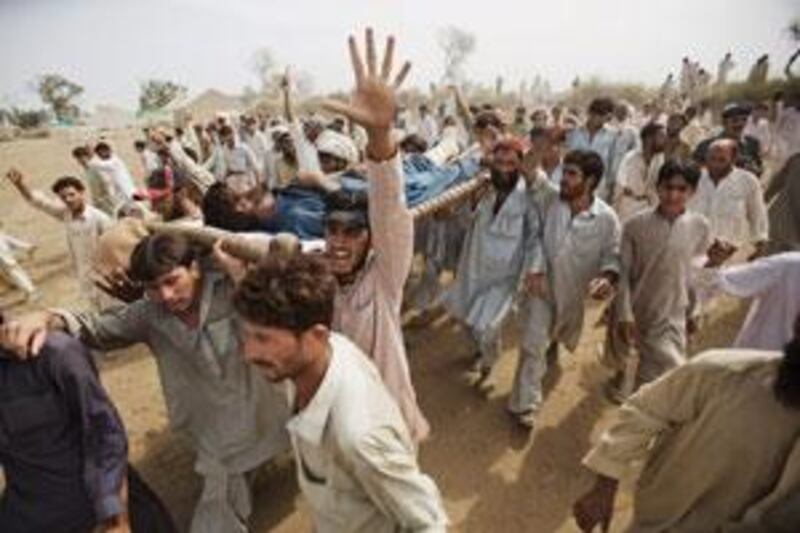ISLAMABAD // Pakistanis who fled fighting between militants and security forces began to return home yesterday despite fears for their safety. The government announced that the first official wave of returnees among more than two million displaced people could return to Swat valley after the army claimed to have cleared the area of militants following nearly three months of fighting.
"This is a gigantic task. We will succeed despite problems," said a senior provincial minister, Bashir Bilour. "There is nothing to worry about. We are taking every step to ensure that all displaced families are safe." However, many of the "internally displaced people" who were scheduled to return to their areas yesterday from camps and houses in the Swabi and Mardan districts of North West Frontier Province (NWFP), did not return partly because of fears of Taliban returning among the people and partly because of the non-availability of government arrangements.
Ayub Khan, a resident of the Daggar town of Buner, said: "Taliban are still present and they are attacking houses and targeting those who raised voice against them. We have no trust in the government's promises. "If the government and the security forces are sincere, why did they not send the government officials first and establish police stations and open government offices in those areas?" Many refugees cited fears raised by the fact that Swat's most notorious militant commanders remain at large.
The army claims to have swept through most of Swat after deploying 20,000 soldiers to clear the area and the neighbouring districts of Dir and Buner of Taliban militants. The operation, which took place after militants from Swat encroached to within 100km of the capital, Islamabad, has been strongly backed by US officials eager to see Pakistan take a more aggressive stance against militants. However, many of the displaced people complained that the faltering start to the campaign showed the government's limited capability to respond to the humanitarian crisis.
Analysts and media commentators complained the government was moving too soon to let people return. Families at some refugee camps refused to go home until they were given aid. Each family was promised 25,000 rupees (Dh1,100). But government officials said they lacked the infrastructure and technology to disburse the cash. Refugees International, a Washington-based advocacy group, said the government was moving too quickly in reopening Swat, a one-time tourist haven. "The army's definition of cleared zones does not necessarily translate into safe zones for civilians," said Patrick Duplat, a Refugees International official.
At the Jalozai camp in the Peshawar area, 20 buses carrying 108 families left in the morning. "The situation is not good in our area, but we have run out of money. There is no option except going back," said Omar Khan, 45. About 200,000 of the displaced were living in camps, but most stayed with relatives and friends. Thousands of them also headed back yesterday, but found themselves blocked by military officials along one major road to the valley. Army officials told them only those returning from the camps under the government plan could go forward. The government-appointed chief of Jalozai camp said no one was being forced to go home and the families due to leave the camp were all going voluntarily, a central concern of the United Nations.
Officials hoped that the number of people returning would pick up once the first returnees get back to their homes and send word that the situation is safe. The level of safety varies greatly within each district. For example, within Buner the Khadokhel area is secure because the Taliban did not reach there. The Chamla area is partially affected and after the restoration of peace, the displaced people from this area have started to return. Almost all the people who migrated from this region have returned during the past two weeks.
But in Gagara, Sultan Was and Pir Baba villages, the worst-affected areas, people are reluctant to go back because they believe the Taliban are still there and they might be attacked. These people fear the launching of another phase of military operation in those areas and this is why they are not going back. Militants killed three local activists of the NWFP's ruling Awami National Party in Pir Baba at the weekend.
An official in the Chota Lahore camp, who did not want to be named, said the people were not ready to leave mainly because of the fear of Taliban. "How can they go back when Taliban are still burning houses in Buner and killing people?" he asked. The people of Swat are even more reluctant to return. Shafiq Khan said members of his family were stranded in the Malakand Pass. Dr Khan, from Swat's capital, Mingora, said: "Now, they can neither come back nor go forward. They have sought refuge at a house there and are living there at the moment.
"What kind of government and what kind of plan is this? We are not allowed to go into our own areas," said the doctor, who is temporarily working at a local hospital in Mardan, where many people from Swat took refuge. iwilkinson@thenational.ae






